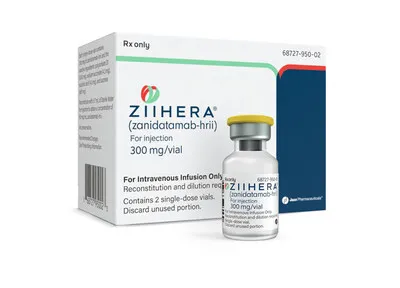
BeOne Medicines Announces Positive Phase 3 HERIZON-GEA-01 Results Supporting ZIIHERA®-Based Regimens as Transformative First-Line Options for HER2-Positive Gastroesophageal Adenocarcinoma
BeOne Medicines Ltd. (Nasdaq: ONC; HKEX: 06160; SSE: 688235), a global oncology company committed to developing innovative therapies for hard-to-treat cancers, announced highly encouraging top-line results from its pivotal Phase 3 HERIZON-GEA-01 clinical trial. The study evaluated the company’s HER2-targeted bispecific antibody ZIIHERA® (zanidatamab) in combination with chemotherapy—either alongside the anti-PD-1 checkpoint inhibitor TEVIMBRA® (tislelizumab) or without immunotherapy—as a first-line treatment for patients with HER2-positive (HER2+) locally advanced or metastatic gastroesophageal adenocarcinoma (GEA). This population includes cancers originating in the stomach, gastroesophageal junction, and esophagus, collectively representing one of the leading causes of cancer mortality worldwide.
The new data position ZIIHERA-based regimens as potentially practice-changing first-line treatment options, demonstrating powerful and consistent improvements across efficacy endpoints compared to the current standard regimen of trastuzumab plus chemotherapy.
Robust Survival Benefits Demonstrated Across Both Investigational Regimens
The HERIZON-GEA-01 trial results revealed that both investigational combinations—ZIIHERA plus TEVIMBRA and chemotherapy, as well as ZIIHERA plus chemotherapy alone—produced clinically meaningful and highly statistically significant improvements in progression-free survival (PFS) compared with trastuzumab plus chemotherapy.
PFS, a key primary endpoint, is particularly critical in metastatic gastroesophageal cancers where disease progression is often rapid and where treatment options have historically produced limited durability. The magnitude of improvement seen with both ZIIHERA-based regimens underscores the therapeutic value of targeting HER2 with a bispecific antibody capable of enhanced receptor clustering and internalization compared to standard monoclonal HER2 agents.
Notably:
- ZIIHERA + TEVIMBRA + chemotherapy achieved clinically meaningful and statistically significant overall survival (OS) improvement.
- ZIIHERA + chemotherapy demonstrated a clinically meaningful OS benefit with a strong trend toward statistical significance, though not yet meeting the significance threshold at the time of first analysis.
OS results are still maturing. A planned interim OS analysis for the ZIIHERA + chemotherapy arm is scheduled for mid-2026, suggesting the possibility that OS significance may be reached as additional events accrue.
Benefits Observed Across PD-L1 Subgroups
One of the most compelling aspects of the trial results is the consistency of benefit observed across key biomarker-defined subgroups:
- Patients with PD-L1–positive tumors experienced strong PFS and OS improvements with ZIIHERA + TEVIMBRA + chemotherapy.
- Importantly, patients with PD-L1–negative tumors—a population less likely to benefit from checkpoint inhibitors—also demonstrated meaningful PFS and OS advantages versus the control arm.
This cross-population benefit suggests that ZIIHERA’s mechanism of action may help enhance the immunogenicity of HER2-positive tumors, potentially making them more responsive to immunotherapy even in the absence of pre-existing PD-L1 expression. Such findings reinforce the biological rationale for combining HER2-targeting with PD-1 blockade and underscore ZIIHERA’s potential as a backbone therapeutic across diverse subsets of HER2+ GEA.
Key Secondary Endpoints Support Overall Efficacy
In addition to strong performance in survival outcomes, both investigational arms delivered consistent improvements in other clinically relevant efficacy measures:
- Objective Response Rate (ORR): Patients receiving ZIIHERA-based regimens achieved higher response rates compared with the control group, indicating a greater proportion of patients experienced meaningful tumor shrinkage.
- Duration of Response (DOR): Responses were more durable in both ZIIHERA arms, supporting the drug’s potential to deliver longer-lasting disease control.
These secondary endpoint improvements reinforce the robustness of the survival benefits and contribute to a cohesive efficacy profile supporting ZIIHERA’s potential role as a best-in-class HER2-targeted agent.
Clinical and Global Significance of the Results
Gastroesophageal adenocarcinomas represent a major global health burden, particularly in East Asia, parts of Europe, and select regions across the Americas. More than one million new gastric cancer cases occur worldwide annually, and survival outcomes in metastatic settings remain poor despite available therapies. First-line treatment regimens combining trastuzumab with chemotherapy have been the standard of care for HER2-positive disease for over a decade, yet incremental survival gains have been limited.
This landscape underscores the clinical importance of HERIZON-GEA-01. Introducing an effective next-generation HER2-targeted therapy such as ZIIHERA has the potential to alter treatment paradigms and significantly improve patient outcomes, especially when paired with PD-1 blockade.
Expert Perspectives Highlight Transformative Potential
Dr. Sun Young Rha, Professor of Medical Oncology at Yonsei Cancer Center in Seoul and an investigator in the HERIZON-GEA-01 trial, emphasized the importance of these results:
Gastric, gastroesophageal junction, and esophageal adenocarcinoma remain major global health challenges, particularly in advanced stages where outcomes are still poor. The positive results of this trial demonstrate that zanidatamab-based combination regimens have the potential to reshape clinical practice for the first-line treatment of HER2-positive metastatic gastroesophageal disease.”
Dr. Rha’s remarks reflect a growing consensus in the oncology community that new HER2-targeted strategies are essential to drive the next wave of innovation in gastroesophageal cancer care.
Mark Lanasa, M.D., Ph.D., Chief Medical Officer of Solid Tumors at BeOne Medicines, reinforced the company’s commitment to delivering new options to patients:
These results represent meaningful progress for a patient community in urgent need of new treatment options. With the high incidence of GEA across many regions where we hold rights to ZIIHERA, we have the opportunity to deliver a major advancement for patients in an area of high unmet need.”
Lanasa also noted the significance of TEVIMBRA’s performance in the study:
This milestone underscores our dedication to advancing therapies for gastrointestinal cancers and demonstrates the potential of TEVIMBRA as an anti-PD-1 backbone in combination regimens. We look forward to collaborating with health authorities in our licensed territories, and to expanding TEVIMBRA’s label to include this combination.”
Safety Profile Consistent with Known Data
Safety is a critical consideration for combination regimens in a population often challenged by comorbidities and disease-related complications. According to BeOne, the safety data for both ZIIHERA combinations—whether used with chemotherapy alone or with the addition of TEVIMBRA—were generally consistent with the known safety profiles of the individual agents.
Key observations:
- No new safety signals were detected in either investigational arm.
- Reported adverse events aligned with expected profiles for HER2-targeted therapy, PD-1 inhibition, and cytotoxic chemotherapy.
- The absence of unexpected toxicities supports a favorable overall benefit-risk profile for ZIIHERA-based regimens in the first-line setting.
These findings will be essential as regulatory discussions progress and as BeOne engages with health authorities regarding potential submissions.
Next Steps and Scientific Dissemination
Given the significance of the findings, BeOne Medicines plans to submit full HERIZON-GEA-01 data for presentation at a major international medical meeting during the first quarter of 2026. The company is also expected to initiate regulatory interactions in regions where it holds commercial rights, potentially advancing ZIIHERA-based regimens toward approval.
The ongoing OS follow-up and planned interim analysis in mid-2026 will provide additional clarity on long-term survival impacts, particularly for the ZIIHERA + chemotherapy regimen.
The positive top-line results from HERIZON-GEA-01 mark a major milestone for BeOne Medicines and represent a potentially transformational step forward for patients with HER2-positive metastatic gastroesophageal adenocarcinoma. With striking improvements in PFS, strong and emerging gains in OS, durable responses, and consistent benefits across PD-L1 subgroups, ZIIHERA-based combinations—especially when paired with TEVIMBRA—could redefine standards of care for this aggressive disease.
Pending further data maturation and regulatory review, ZIIHERA has the potential to become a new cornerstone of first-line therapy for HER2-positive GEA worldwide.
HERIZON-GEA-01 (NCT05152147) is a global, randomized, open-label Phase 3 trial, conducted jointly with Jazz Pharmaceuticals, to evaluate and compare the efficacy and safety of ZIIHERAplus chemotherapy, with or without TEVIMBRA, to the standard of care (trastuzumab plus chemotherapy) as first-line treatment for adult patients with advanced/metastatic HER2+ GEA. The trial randomized 914 patients from approximately 300 trial sites in more than 30 countries.

Appropriate patients for this trial had unresectable locally advanced, recurrent or metastatic HER2+ GEA (adenocarcinomas of the stomach or esophagus, including the gastroesophageal junction), defined as 3+ HER2 expression by IHC or 2+ HER2 expression by IHC with ISH positivity per central assessment. Patients were randomized to the three trial arms: ZIIHERAin combination with chemotherapy and TEVIMBRA; ZIIHERA in combination with chemotherapy; and trastuzumab plus chemotherapy. The trial is evaluating dual primary endpoints, PFS per blinded independent central review (BICR) and OS.
Gastroesophageal adenocarcinoma (GEA) is the fifth most common cancer worldwide, and approximately 20% of patients have HER2-positive disease.1,2,3 HER2-positive GEA has high morbidity and mortality, and patients are urgently in need of new treatment options. The overall prognosis for patients with GEA remains poor, with a global five-year survival rate of less than 30% for gastric cancer and about 19% for GEA.4
ZIIHERA (zanidatamab) is a bispecific human epidermal growth factor receptor 2, or HER2-directed antibody that binds to two extracellular sites on HER2. Binding of zanidatamab with HER2 results in internalization leading to a reduction in HER2 expression of the receptor on the tumor cell surface. Zanidatamab induces complement-dependent cytotoxicity (CDC), antibody-dependent cellular cytotoxicity (ADCC) and antibody-dependent cellular phagocytosis (ADCP). These mechanisms result in tumor growth inhibition and cell death in vitro and in vivo.5
Zanidatamab is being developed in multiple clinical trials as a targeted treatment option for patients with solid tumors that express HER2. Zanidatamab is approved in China for treating HER2-high-expression biliary tract cancer (BTC). ZIIHERA also has been approved in both the U.S. and the European Union for eligible BTC patients. Zanidatamab is being developed by Jazz and BeOne under license agreements from Zymeworks, which first developed the molecule. BeOne has licensed zanidatamab from Zymeworks in Asia (excluding India and Japan), Australia and New Zealand. Jazz Pharmaceuticals has rights in all other countries.
ZIIHERA is a registered trademark of Zymeworks BC Inc.
TEVIMBRA is a uniquely designed humanized immunoglobulin G4 (IgG4) anti-programmed cell death protein 1 (PD-1) monoclonal antibody with high affinity and binding specificity against PD-1. It is designed to minimize binding to Fc-gamma (Fcγ) receptors on macrophages, helping to aid the body’s immune cells to detect and fight tumors.
TEVIMBRA is the foundational asset of BeOne’s solid tumor portfolio and has shown potential across multiple tumor types and disease settings. The global TEVIMBRA clinical development program includes almost 14,000 patients enrolled to date in 35 countries and regions across 70 trials, including 22 registration-enabling studies. TEVIMBRA is approved in at least one indication in 47 markets, and more than 1.8 million patients have been treated globally.
Source Link: https://www.businesswire.com/





